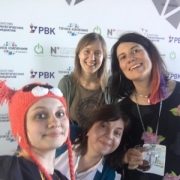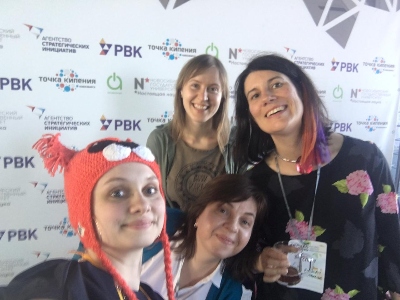To Russia and back… by the skin of my teeth!
The rate of current social and economic change is breath-taking. My second visit to Siberia will forever be associated not only with the horrors unfolding in Western Europe but also the capacity for human kindness, generosity and love in a society that is often stereotyped and treated with suspicion.
It began as a fairly routine trip, albeit with the Coronavirus headlines in the press but not really penetrating much further than advice not to shake hands and to wash them for 20 seconds. The plane out to Moscow was very quiet, but the final leg of the journey to Novosibirsk in Siberia was packed, as the following day (Sunday) was International Women’s Day, a major holiday in Russia. Novosibirsk is the third largest city in Russia, after St Petersburg and Moscow, and is 7 hours ahead of GMT. The city’s name means ‘new Siberia’ due to its relative youth growing largely over the time since the arrival of the Trans-Siberian Railway and it’s positioning away from Moscow during the Cold War.
On arrival I was greeted by Irina (my exchange peer) at the airport. Hugs that were becoming less commonplace in the UK were still generously shared around and although I mentioned Coronavirus, it was mainly in the context of jokes about toilet paper shortages in the UK!
International Women’s Day celebrates all women and is a big family occasion. I was invited to Irina’s sister-in-law Polina’s house where I met Irina’s family, including her parents-in-law Vladimir and Luba. They live in Chita, which is further East near to the Mongolian border. It sounded a lovely place with its own bottled spring water (although quite an acquired taste!) Vladimir is originally from Buryatia, which is a republic in the Far East (of Russia) where they have their own dialect and the native people, Buryatians, are ethnically similar to Mongols. Luba however is originally from Crimea and told me that it was controversial for her to have married a man from an ethnic minority. Luba is a musician and a very passionate woman and even though they didn’t speak any English, I felt an immediate bond thanks to Irina’s excellent translation services!
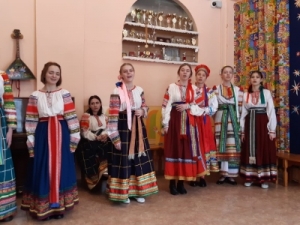 The next day, a state holiday, I was guest of honour at the Folklore School ‘Lel’. This school keeps up the traditions of Siberian traditional singing and dancing for girls who are interested in becoming ‘folklore’ teachers. They taught the stories behind the dances and songs and even invited me to join them to become a dancing ‘fence’!
The next day, a state holiday, I was guest of honour at the Folklore School ‘Lel’. This school keeps up the traditions of Siberian traditional singing and dancing for girls who are interested in becoming ‘folklore’ teachers. They taught the stories behind the dances and songs and even invited me to join them to become a dancing ‘fence’!
I was very touched by all the dedication and that the girls showed, particularly when a deaf girl showed me how she passionately ‘signed’ along to a popular song (she was apparently due to sign to the song when the star who sang it appeared in Novosibirsk, live on stage!)
Olga, one of the teachers, spoke English and told me that she had visited the UK in in the 1990s with her mother. Apparently she attended an exchange to Portsmouth and even met the mayor, although they were embarrassed to say that they didn’t remember his name. I explained that mayors of most major cities in the UK are merely ceremonial and it was unlikely the people of Portsmouth would remember either (apologies to any local councillor’s reading this)! Afterwards we all shared some cake, tea and pies (a Siberian speciality) and the students were interested to hear English actually being spoken as a ‘real’ language (not as a school subject). There are so few foreigners that come to that part of the Russia.
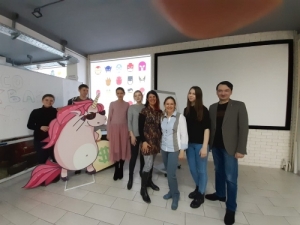 Following the extended celebrations, we started work later the next day as I was still adjusting to the time difference. We went to speak to a number of students and lecturers from Novosibirsk’s Technical University at their Innovation/Incubation Hub. It was an open invitation and appeared to attract a number of different disciplines including environmental sustainability and healthcare. It was a small gathering, so we were able to have a conversation about the lessons of certification as well as the challenges of different disciplines taking on different agendas. It seems academic silos are the same the world over. It was encouraging that a number of academic social entrepreneurs were very engaged in developing their ideas.
Following the extended celebrations, we started work later the next day as I was still adjusting to the time difference. We went to speak to a number of students and lecturers from Novosibirsk’s Technical University at their Innovation/Incubation Hub. It was an open invitation and appeared to attract a number of different disciplines including environmental sustainability and healthcare. It was a small gathering, so we were able to have a conversation about the lessons of certification as well as the challenges of different disciplines taking on different agendas. It seems academic silos are the same the world over. It was encouraging that a number of academic social entrepreneurs were very engaged in developing their ideas.
One of the reasons that I travelled to Russia again was because we wanted to explore a new ‘social enterprise regulation’, which was approved by the government last January. This allows mainstream businesses to convert to become social enterprises. There is much more regulation and restriction of organisations depending on their legal structures. For instance, NGOs are largely unable to trade and can only gain income through foundations. This poses challenges and it is hoped that the new law will enable existing ‘for profits’ and new social enterprises to set up.
On this basis, the local Chamber of Business organised an event for local business people, which I addressed with the help of my new translator Yuliya. There was a lot of interest in the idea of social enterprise and some interesting questions. I got the general feeling that social enterprise led accreditation was a welcome alternative to more regulation from government, so I’m not sure how much the new law will help with conversions, although it was interesting to hear that the spirit of the new laws seemed spookily to map our criteria! Perhaps the work that we did a number of years ago with Russia’s Our Future Foundation helped to shape this?
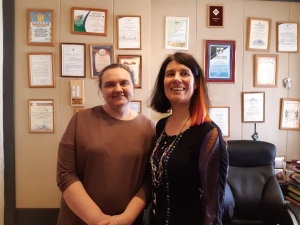 I also visited a local disability support organisation, set in a very ‘Soviet style’ housing estate. The building (but none of the bills) was provided for free by the local authorities, but this came with restriction clauses in terms of use – no commercial activity was allowed. This was very frustrating for the boss Irina (another one!) who obviously had huge entrepreneurial flare but could not sell the pottery that her clients were making (only donations are allowed).
I also visited a local disability support organisation, set in a very ‘Soviet style’ housing estate. The building (but none of the bills) was provided for free by the local authorities, but this came with restriction clauses in terms of use – no commercial activity was allowed. This was very frustrating for the boss Irina (another one!) who obviously had huge entrepreneurial flare but could not sell the pottery that her clients were making (only donations are allowed).
They had however managed to corner the market in Russian Braille school textbooks, which they are allowed to sell, but these were huge and space restricted due to the building size. We talked through potential solutions, the main being to find a better building as well as potentially setting up a separate trading company, but it seems much local and federal bureaucracy puts up barriers to the development of social enterprise in Siberia, even if there is a new law.
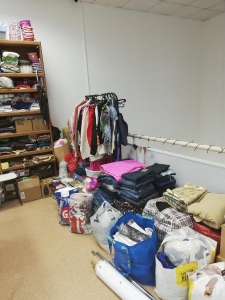 Environmentalism is a real growth area in Siberia. Recycling is carried out but it is not yet embedded as there are no kerbside recycling schemes. I visited Green Squirrel, which is run by a very enthusiastic bunch of young people who I met last time I came to Siberia. They collect recycling and reuse/upcycle many of the items donated where they can. I was given a set of waterproof shoe covers made out of old umbrellas (very useful for cycling!)
Environmentalism is a real growth area in Siberia. Recycling is carried out but it is not yet embedded as there are no kerbside recycling schemes. I visited Green Squirrel, which is run by a very enthusiastic bunch of young people who I met last time I came to Siberia. They collect recycling and reuse/upcycle many of the items donated where they can. I was given a set of waterproof shoe covers made out of old umbrellas (very useful for cycling!)
However, it’s clear that these sorts of schemes have traditionally been ad-hoc and grant led, which means they need to scale up or find other income generating activities in order to achieve financial viability. The concept of cross-subsidisation seems to be pretty new in Russia (or at least to the groups that I encountered), perhaps to historical state and subsequent business culture/NGO grant reliance.
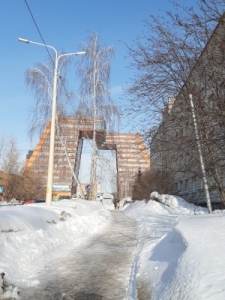 The crescendo of the trip was the 2-day Social Entrepreneurs Festival, which had been one of the main reasons for the timing of my visit. It was held at Akademgorodok – a university about 10 miles outside Novosibirsk in the woods. It’s an amazing campus and has an interesting history, as it was built largely on the initiative of a number of academics who came together in the 1950s to set up an idealised scientific community ‘away from it all’. It’s like a small city within its own right, albeit in lovely wooded surroundings. We were based in a weird, futuristic building locally nicknamed ‘the geese’ as it emulated two geese kissing.
The crescendo of the trip was the 2-day Social Entrepreneurs Festival, which had been one of the main reasons for the timing of my visit. It was held at Akademgorodok – a university about 10 miles outside Novosibirsk in the woods. It’s an amazing campus and has an interesting history, as it was built largely on the initiative of a number of academics who came together in the 1950s to set up an idealised scientific community ‘away from it all’. It’s like a small city within its own right, albeit in lovely wooded surroundings. We were based in a weird, futuristic building locally nicknamed ‘the geese’ as it emulated two geese kissing.
The festival brought people from towns and cities across Siberia. I was the only international visitor and it seemed hard for people to get their head around the fact that I wasn’t from London… Devon was not a place that they had heard of!! I was one of the headliners but it was a new challenge giving a keynote whilst waiting for translation. I was feeling a bit off colour too, so was worried that I might be Case 0 of Coronavirus in Siberia!!! I also had an interesting discussion with an American who has lived in Russia since the 90’s (I first met her last year). She had some great ideas about the greater level of ambition that the social enterprise world should be taking in Novosibirsk given her US experiences.
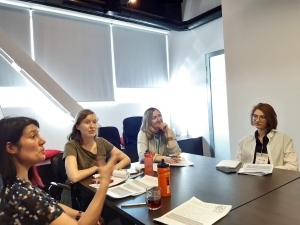 I was relieved that I felt much better on the second day when I ran a Social Impact workshop talking to a number of NGOs with Irina and Yuliya on translation duty. We used our Social Impact Guidance to take people through the steps and discuss each point, in groups. Because we had a number of new organisations in the group some of the discussions were more academic, but it did help to clarify better the objectives and plan for the impact that they wanted to make.
I was relieved that I felt much better on the second day when I ran a Social Impact workshop talking to a number of NGOs with Irina and Yuliya on translation duty. We used our Social Impact Guidance to take people through the steps and discuss each point, in groups. Because we had a number of new organisations in the group some of the discussions were more academic, but it did help to clarify better the objectives and plan for the impact that they wanted to make.
I was amused to have a very nice guy in the group who was representing Siberia’s arm of Putin’s political social support organisation. I tried to persuade him that their social impact should be about supporting and enabling social enterprises rather than setting them up and running them!!
The festival was my last official appointment, but alas not the end of dramas due to Coronavirus. During my last evening in Novosibirsk I had a message from my brother saying that Russia was partially closing its borders. The message was ambiguous so it wasn’t clear whether my flight from Moscow airport would be cancelled. I quickly got in touch with Irina and my husband to see if we could find out more. We couldn’t ascertain much so I was on tenterhooks until I finally made the flight back from Siberia to be reassured at the airport that my connecting flight from Moscow was indeed still scheduled. Of course subsequent to this I realised that other people abroad have not been as lucky as I was.
Coronavirus aside, it was an amazing trip and many heartfelt thanks go to Irina, her family and her colleagues at the Siberian Centre. I hope to be able to return the hospitality when she is finally able to visit us in Devon, although I don’t know if we will ever be able to compete with the warmth and friendliness of the Siberian people. I have now been bitten by the bug and long to go back, maybe as a tourist, to explore the amazing lakes and countryside – but probably later in the summer (or beyond) when there is no danger of a global pandemic!!

